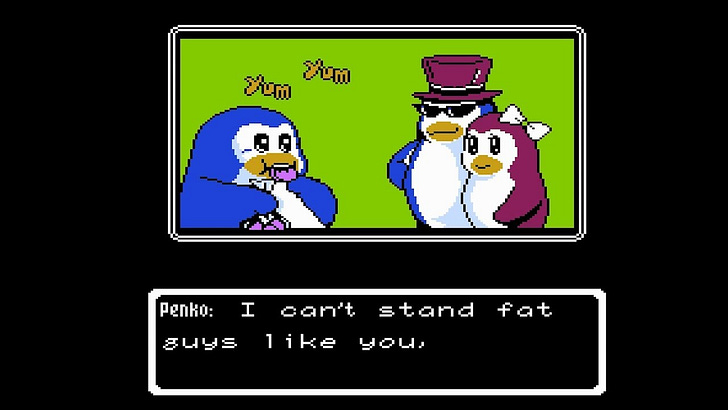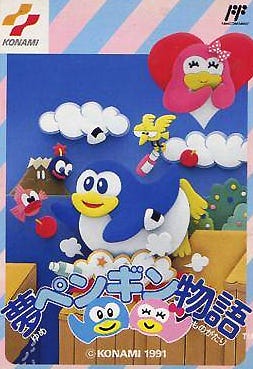Retro spotlight: Yume Penguin Monogatari
Wishing you all better relationships with your partners than this one on Valentine's Day.
This column is “Retro spotlight,” which exists mostly so I can write about whatever game I feel like even if it doesn’t fit into one of the other topics you find in this newsletter. Previous entries in this series can be found through this link.
Yume Penguin Monogatari — which translates to Dream Penguin Adventure — is a lot of fun as far as the pure gameplay elements go. It’s a platformer with a transforming penguin, and you don’t have a life bar. Instead, the time you have left to complete the level drops significantly every time you collide with an enemy, and coming into contact with projectiles transforms you, changing your abilities. In some ways, there’s some proto-Wario Land elements in Konami’s Japan-only Famicom platformer, and this is a pro-Wario Land space if there ever was one.
There are some things that need pointing out, though. Like how the above paragraph was worded the way it is for a reason. The “transforming” the penguin, Penta, does in the game is tied to his weight. There’s a meter on screen that shows Penta’s current condition, which breaks down to "“Chubby,” “Normal” (come on), and “Thin.” The projectiles you’re dodging are food, which, if Penta eats, will cause him to gain weight. Now, simply on a gameplay level, all this isn’t the worst thing in the world: Penta has different abilities depending on his weight, with him capable of heavy attacks on foes when he’s bigger, higher-ranged kicks when he’s in the middle, and higher agility — plus his own projectile attack — when he’s at his thinnest. The issue is more the why of the weight mechanic than the mechanic itself.
Penta’s girlfriend, Penko, has had enough of Penta’s weight. The game opens with a cutscene showing Penta having a snack, and Penko showing up to berate him about his weight and say that she’s going on a date with another penguin: if Penta wants to salvage their relationship, he’ll lose the weight. As if this isn’t judgmental enough, the only way to successfully complete one of Yume Penguin Monogatari’s stages is to be sufficiently thin enough for Penko’s goalpost-moving desires by the end. If Penta hasn’t managed to lose or keep off enough weight by the end of one of the game’s six stages, she officially breaks things off, and you get the chance to quit or retry the stage.
We never learn what’s going on with Penta, who also starred in a couple other Konami titles before this one: Antarctic Adventure on the MSX, and Penguin Adventure, which happens to be Hideo Kojima’s first credit. But he’s put on some weight since those days, and seems fine enough with the situation… at least, until Penko serves him with an ultimatum where she actually says, not implies, “I can’t stand fat guys like you, Penta” before announcing her intention to date a penguin who looks as if he’s a mustache away from tying her to some railroad tracks.
Speaking as someone who put on quite a bit of weight before eventually losing it just last year… what the shit? The additional weight wasn’t just weight, but was me being severely out of shape, and it was giving me myriad health issues related to back and neck pain, which caused trouble sleeping, which in turn helped increase stress, which then caused all sorts of other problems like headaches and nerve issues and depression and a need to lay in bed all the time (yes, due to my agonies). So yeah, I ended up exercising and changing my routines and making better decisions with snacks and such, and the weight — and all associated health issues — are gone now. I’m back to playing pickup basketball regularly for the first time in years, I’m excited to play a season of softball while having my old speed and stamina back. I’m glad that when my kids want to play my first instinct isn’t to sigh about how I genuinely don’t have the energy or pain tolerance left to do it. You know what didn’t happen during any of the bad times? My wife threatening to leave me while I ate a couple more brownies than I should have. There probably would have been some more brownies had that happened.
Penta has some extra pounds on him compared to his days in his previous adventures, sure, but what’s it to you? This is a penguin who seemed happy, who was still capable of jumping and platforming and completing these levels. He’s in better shape than I was at my worst, that’s for sure — a higher weight, being fat, that’s not inherently unhealthy, just like being thinner isn’t inherently healthy. What did you do to support your partner while he was unemployed between 1986 and Yume Penguin Monogatari’s 1991 release, Penko? Did you simply watch his habits change, never considering that maybe the source of the problems you see had to do with the pressures of needing to work to survive, in a changing video game landscape that now expected more than what he had given in the past? That he needed an understanding shoulder to cry on, someone to lean on, as he sorted out the direction of his life? And that maybe he couldn’t trust you’d be that penguin for him, not when you’d leave him and blame his weight for your departure, causing a further spiral? Of course you didn’t, you’re a cartoon penguin I’m projecting onto for narrative purposes. But you should have!
If Penta needed to lose the weight, then sure, go for it my penguin friend, you have my support. Get your body to where you want it to be, to where you feel comfortable and right. If he’s only doing it because his supposed love is threatening to leave if he doesn’t, though… Well, then, there’s an unhealthy relationship on display in Yume Penguin Monogatari, and it isn’t with food. Dump her, Penta, you do what you need to do, and if she comes crawling back after top hat over there breaks her heart, then you get to decide whether getting back together is what’s right for you, or if you’re in a different place now, one where you won’t be browbeaten by your supposed partner.
Completely fucked up relationship elements aside, Yume Penguin Monogatari is actually quite a bit of fun. There’s no life bar, but the fitness meter practically is: the representation is that he’s too big to move quickly, but it has the same effect, in practice, as being too injured to move well. Being “Thin” is basically just full hearts with a projectile weapon bonus. The levels are designed well, and the emphasis is very much on avoiding taking “damage.” Time is short in these stages, and when you collide with a foe, you can lose 10 seconds on the clock. If Penta comes near food — enemies throw apples and onigiri at Penta — his fitness meter adds some weight. There are certain points on the meter where transformations occur that change his shape and abilities. Again, it’s not a health meter, but it’s not not a health meter.
The way to lose weight is to collect some diet drinks: the orange ones empty one tick on the gauge, while the pink bottles, the rarer ones, remove three ticks’ worth of weight. They’re represented as diet drinks, but using the above logic, they’re basically just health items. Now, you can wonder about the conflation of “healing” with “dieting” here and raise an eyebrow, but I don’t think Konami was going that deep with anything. There was a meeting where designers went, “hey wouldn’t it be funny if” and things kind of went from there. How else do you end up in a situation where Penta’s worst foe is actually water? That’s right: you’ve gotta watch out for that water weight. And to add to the comical nature of things, Ginji, the penguin Penko is starting to date, is the antagonist whose goal is to make sure Penta doesn’t lose the weight: it’s his minions who stand in his way of a proper exercise regimen and turn it all into a platforming violence fest.
The game is split into three platforming stages and three horizontal shoot ‘em up levels, where the speed of Penta’s plane depends on his current shape. Fitting, really, since it’s Penta’s son, Pentarou, who appears in most of the Parodius shooting games. The game also loops once — beating it a second time gives you the true ending. Even with that, though, this game is short. Like, arcade game levels of short. Still, though, it’s all in whether it’s an enjoyable time, and for all my eyebrow-raising at the Penko character and her motivations and the things she says and everything the central mechanics imply… Yume Penguin Monogatari is still fun when it’s not being outwardly nasty to poor Penta between levels.
While the game never received an international release, Vice Translations released an unofficial one 18 years ago now, which was last updated in 2015. The above cutscene screenshot uses that translation patch, as does the embedded video showing gameplay. Emulating it is the one way to experience Yume Penguin Monogatari outside of actually owning a Famicom and the cartridge: Konami hasn’t re-released it anywhere, making it the one mainline adventure of Penta to exist solely on its original platform: Antarctic Adventure received a number of ports in the 80s, as well as inclusion on the Konami Antiques MSX Collection for the Sega Saturn, while Penguin Adventure released on MSX and eventually mobile platforms.
For preservation purposes, having Yume Penguin Monogatari released somewhere would be good, but you can also understand why it hasn’t been re-released, given everything it’s built around. Still, though, there’s a fun game in here, and a wonderfully animated and bright and imaginative one, too. It’s just wrapped in some unpleasant body shaming and one judgmental penguin.
This newsletter is free for anyone to read, but if you’d like to support my ability to continue writing, you can become a Patreon supporter, or donate to my Ko-fi to fund future game coverage at Retro XP.





